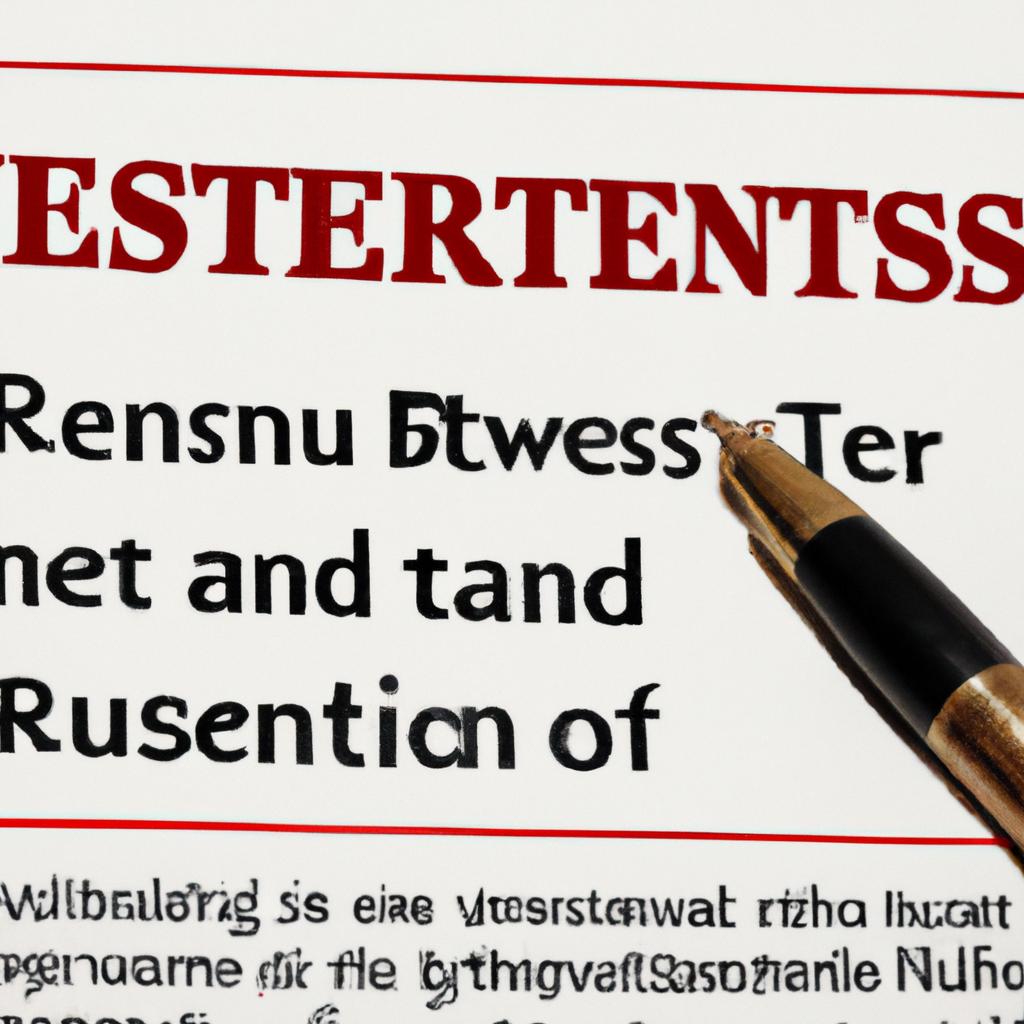In the realm of estate planning, a trust restatement is a strategic tool utilized to modify the terms of an existing trust without the need for completely rewriting the document. As experienced practitioners in the field of trusts and estates, the team at Morgan Legal Group in New York City is well-versed in the intricate process of trust restatements. Join us as we delve into the intricacies of trust restatements and unravel the nuances of this valuable estate planning technique.
Understanding the Purpose of a Trust Restatement
When it comes to estate planning, a trust restatement is a critical tool that allows for the modification of an existing trust document without the need to create an entirely new trust. This process is essential for ensuring that a trust continues to meet the needs and intentions of the grantor and beneficiaries as circumstances change over time.
By , individuals can take proactive steps to keep their estate plans up to date and in line with their current wishes. Some key reasons for considering a trust restatement include changes in tax laws, family dynamics, financial circumstances, and charitable giving goals. Through the careful review and amendment of a trust document, individuals can ensure that their assets are distributed according to their wishes and that their loved ones are provided for in the best possible way.

Key Considerations for Deciding to Restate a Trust
When considering whether to restate a trust, there are several key factors to keep in mind. First and foremost, it is essential to assess the current needs and goals of the trust and determine if the existing trust document aligns with these objectives. If there have been significant changes in your life or in the law since the trust was originally established, a restatement may be necessary to ensure that your intentions are accurately reflected.
Additionally, it is important to review the terms of the trust to determine if they are still relevant and effective. If there are any ambiguities or inconsistencies in the trust document, a restatement can help clarify these issues and provide greater certainty for all parties involved. Furthermore, if you wish to make any amendments or updates to the trust, a restatement may be the most efficient and cost-effective way to achieve these changes.

Benefits of Updating a Trust Through a Restatement
Updating a trust through a restatement can offer numerous benefits for individuals looking to make changes to their existing trust documents. A trust restatement allows for the modification of specific provisions within the trust without having to completely rewrite the entire document. This can save time and money compared to creating a new trust from scratch.
Some of the key include:
- Flexibility: Trust restatements allow for changes to be made to the trust without affecting the overall structure of the document.
- Clarity: Restatements can help clarify ambiguous language in the trust document and ensure that the intentions of the grantor are accurately reflected.
- Cost-Effectiveness: Restating a trust is often more cost-effective than creating a new trust, as it involves updating existing documents rather than starting from scratch.

Expert Recommendations for Effectively Utilizing a Trust Restatement
Understanding Trust Restatements
Trust restatement is a legal process through which the terms and provisions of a trust document are modified or updated without having to completely revoke the existing trust. This can be a useful tool for individuals who want to make changes to their trust without going through the hassle of creating a new trust from scratch.
When considering a trust restatement, it is important to consult with a qualified estate planning attorney who can provide valuable guidance and ensure that the process is carried out correctly. Below are some :
- Reviewing the current trust document to identify necessary changes
- Consulting with all interested parties to ensure their needs and concerns are addressed
- Working with an experienced attorney to draft the restatement document
- Reviewing and executing the restatement document in accordance with state laws
| Benefit | Impact |
|---|---|
| Flexibility | Allows for modifications without revoking the entire trust |
| Cost-Effective | Avoids the expenses associated with creating a new trust |
Q&A
Q: What is a trust restatement?
A: A trust restatement is a legal document that amends or updates the terms of an existing trust without invalidating the entire trust.
Q: Why would someone consider a trust restatement?
A: A trust restatement may be necessary if there have been changes in family circumstances, tax laws, or the financial situation of the trust beneficiaries.
Q: How does a trust restatement differ from creating a new trust?
A: Creating a new trust involves transferring assets into a completely new trust, while a trust restatement simply modifies the terms of the existing trust.
Q: Is a trust restatement a complicated legal process?
A: While trust restatements involve legal documentation and potentially consulting with a lawyer, they can be a simpler and more cost-effective option than creating a new trust from scratch.
Q: What are some common reasons for seeking a trust restatement?
A: Common reasons for seeking a trust restatement include changes in family relationships, wanting to add new beneficiaries, or updating the trust to reflect current tax laws.
Q: Can a trust restatement be revoked or changed in the future?
A: Yes, a trust restatement can typically be amended or revoked at any time as long as the grantor is of sound mind and follows the proper legal procedures.
To Wrap It Up
In conclusion, a trust restatement is a valuable tool that allows trustees to update and revise the terms of a trust without creating an entirely new document. By understanding the benefits and process of trust restatements, trustees can ensure that the trust continues to best serve the needs and intentions of the grantor and beneficiaries. So whether you are looking to make minor tweaks or major revisions, a trust restatement may be the solution you need to keep your trust current and effective.
 Trust Restatement: Understanding the Basics and Why It’s Important
Trust Restatement: Understanding the Basics and Why It’s Important
Are you someone who has recently established a trust or been named as a beneficiary in one? Or perhaps you’re a trustee managing a trust on behalf of someone else. In either case, you may have heard the term “trust restatement” thrown around and wondered what it means exactly.
A trust restatement is a legal document that amends or updates the terms of an existing trust. It is essentially an opportunity to make changes to an already established trust without having to completely revoke it and create a new one. In this comprehensive article, we’ll delve deeper into what a trust restatement is, why it may be necessary, and how to go about getting one.
Understanding Trusts: A Brief Overview
Before we dive into the specifics of trust restatements, let’s start with a quick overview of what trusts are and how they work. A trust is a legal arrangement where a trustee holds and manages assets on behalf of a beneficiary. Trusts can be created for various reasons, such as ensuring the financial security of loved ones, protecting assets, or managing wealth for future generations.
There are different types of trusts, including revocable and irrevocable trusts. A revocable trust, also known as a living trust, can be modified or revoked by the grantor (the person who created the trust) during their lifetime. On the other hand, an irrevocable trust cannot be changed or terminated once it has been established, except in rare circumstances.
Understanding Trust Restatements
A trust restatement is a relatively straightforward process that involves amending the terms of a trust. Essentially, a trust restatement functions as a revised version of the original trust document. It outlines the changes that have been made to the trust, while also referencing and incorporating the original terms of the trust that have not been altered.
Why is a Trust Restatement Necessary?
There are several reasons why someone may choose to amend an existing trust through a restatement rather than revoking it and creating a new one. Some of these reasons include:
1. Changes in personal circumstances: Life is full of unexpected twists and turns, and sometimes those changes may warrant adjustments to a trust. This could include a new marriage, divorce, or the birth of a child.
2. Changes in financial circumstances: A trust may need to be revised if there has been a significant change in the grantor’s wealth or if the assets in the trust have appreciated in value.
3. Changes in tax laws: Tax laws are complex and ever-evolving. A trust restatement can help ensure that a trust remains compliant with current tax laws and potentially minimize any tax consequences.
4. Streamlining multiple trusts: In some cases, multiple trusts may have been created for different purposes but could be consolidated into one trust through a restatement, making it easier to manage and administer.
How Does a Trust Restatement Work?
The process for restating a trust can vary depending on the individual’s personal circumstances and the trust itself. Typically, the first step is to review the original trust document and determine which aspects need to be amended. This could include adding or removing beneficiaries, updating asset details, or changing the terms of distribution.
Once the necessary changes have been identified, a trust restatement document must be drafted. This document must clearly outline the new terms and reference the original trust document. It is essential to work with an experienced estate planning attorney to ensure that the restatement is legally valid and will not cause any unintended consequences.
Once the trust restatement has been finalized and executed, it should be kept alongside the original trust. It is essential to inform all relevant parties, such as beneficiaries and trustees, about the changes made through the restatement.
Benefits and Practical Tips
There are several benefits to opting for a trust restatement rather than creating a new trust. First and foremost, it can save time and money. Rather than starting from scratch, a restatement simply amends and updates the existing trust, which can be a much more efficient option.
Additionally, a trust restatement allows for more flexibility. The grantor can make changes to the trust as their circumstances and needs evolve, without the need to entirely dissolve the trust and create a new one.
However, it is essential to keep in mind that a trust restatement may not always be the ideal option. In some instances, revoking the original trust and creating a new one may be a more appropriate course of action. Working with an experienced estate planning attorney can help ensure that the best decision is made based on the individual’s unique situation.
Case Studies and First-Hand Experience
To provide some real-life examples, here are two case studies of situations where a trust restatement may have been utilized:
1. A couple establishes a trust for their children, but one child passes away before the trust assets are distributed. In this scenario, a trust restatement may be necessary to amend the distribution of assets and potentially add grandchildren as beneficiaries.
2. An individual creates an irrevocable trust to minimize their tax liabilities. However, years later, they experience a significant financial increase, and the trust is no longer as effective in managing their wealth. In this case, a trust restatement may be appropriate to revise the trust’s terms and potentially make it revocable.
In Conclusion
In summary, a trust restatement is a legal document that amends an existing trust without revoking it entirely. It is a practical, efficient, and flexible option for making changes to a trust as personal circumstances and needs evolve. However, it is crucial to seek professional legal advice to ensure that the trust restatement is executed correctly and aligns with the individual’s intentions.
So, the next time you come across the term “trust restatement,” you’ll now have a better understanding of what it means and its potential benefits. Remember, when it comes to trusts and estate planning, it is always prudent to stay informed and seek professional guidance to make the best decisions for your personal circumstances.


